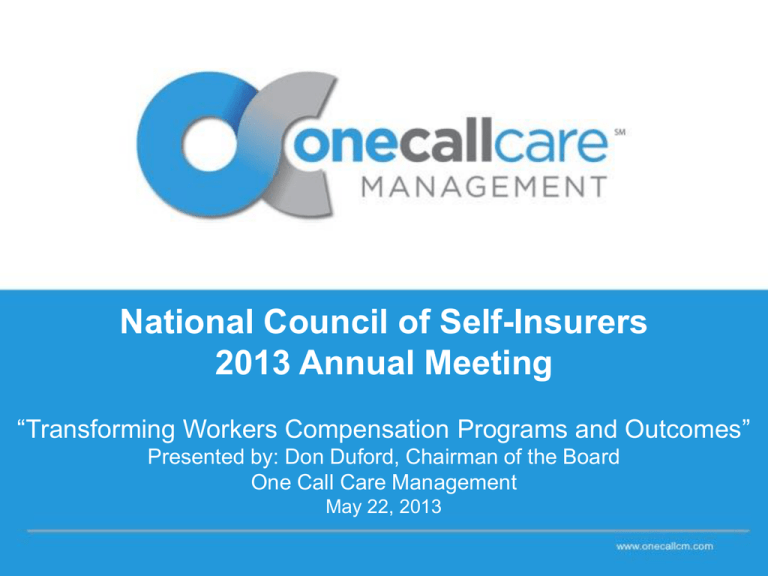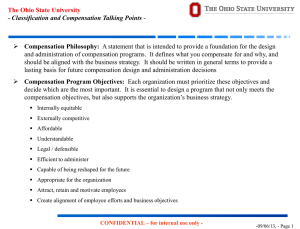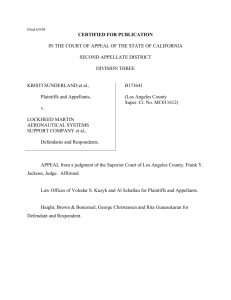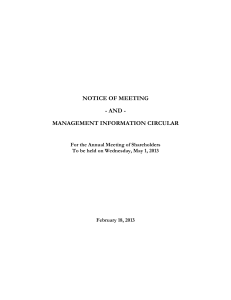Requirement 1 - National Council of Self Insurers
advertisement

National Council of Self-Insurers 2013 Annual Meeting “Transforming Workers Compensation Programs and Outcomes” Presented by: Don Duford, Chairman of the Board One Call Care Management May 22, 2013 What is One Call Care Management? One Call Care Management (OCCM) is the nation’s leading partner in providing specialized services that lead to faster, more efficient and more cost-effective resolution of claims. From high-end diagnostic procedures, to post-discharge and home care management, to transportation and language services, to superior dental programs and other medical specialties, OCCM provides reliable, consistent connections to care and improved outcomes. Three Stories, Three Outcomes – One Health Care System HealthCare for Workers’ Compensation: Success Factors The “Right” doctor: A good clinician who understands return to work Urgency: Aggressive pursuit of root cause and solution Teamwork: A team of appropriate specialties linked with information to move the case forward Can the More Successful Health Delivery Models Apply to Workers Compensation? McKinsey's Three Criteria Are Present in the Integrated Care Model Integrated care can be implemented in virtually any health system if these conditions are present: A focus on the patient segments most likely to have high health care spending Core care delivery processes that enable multidisciplinary teams to function effectively Key support components including accountability, joint decision-making and clinical leadership, information sharing and aligned incentives "What It Takes to Make Integrated Care Work" McKinsey & Company Health International 2011 Number 11 Workers’ Compensation Transformation Requirement 1: The Ability to Identify High Performing Primary Doctors and Specialists Predictive analytics can now identify the physicians who are the best workers’ compensation doctors Approaches include clinical pathways, adherence to guidelines, overall performance Achievable in the workers’ compensation setting; difficult for general health care populations Workers’ Compensation Transformation Requirement 2: The Availability of “Virtual Teams” of Best-in-Class Specialty Services Networks of specialty providers are routinely available with accessibility to 95% of all injured workers. Includes specialties like diagnostic testing, prescription drug management, physical therapy, home care, durable medical equipment, dental professionals, transportation and translation experts Networks provide focused credentialing, scheduling services, efficient information flow between stakeholders High performing physicians, working with these high performing specialties deliver superior quality care from first report of injury to return-to-work Workers’ Compensation Transformation Requirement 3: Technology Can Link the “Best of the Best” Today’s technology enables these superior healthcare providers and specialists to be linked throughout the life of the claim Proactive and automated communications reduce delays, deliver reports, and speed decisions that move the injured worker’s care plan forward Patient progress can be tracked, and corrective action implemented if they go “off the tracks” How Does Integrated Care Change the Game In Workers’ Compensation? Early intervention and planning aligns the therapies, equipment, and providers to eliminate delays and administrative hassles Each component of the treatment plan is delivered by superior providers who produce superior outcomes Pain is treated aggressively to avoid long-term disability and potential addiction The ball is never dropped or fumbled! Integrated Workers’ Compensation Care Creates a Win/Win/Win Improved medical and total claim outcomes Reduced overall costs Streamlined efficiencies throughout the life of the claim One Call Care Management One Call Care Management www.onecallcm.com









